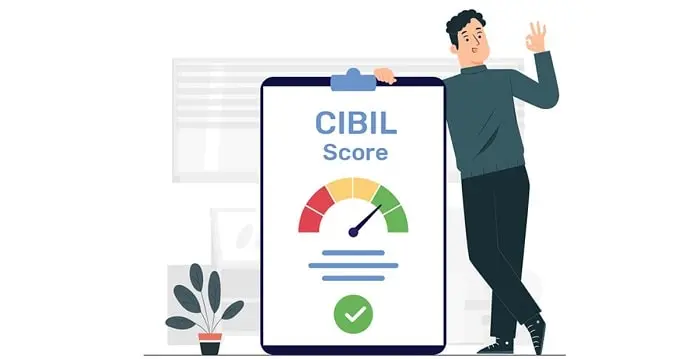CIBIL Score Advantages and Disadvantages
With the introduction of the lending system, there was a need for a central database which maintained the person’s records. This was when the CIBIL came into play. The credit bureau gives the score, and there are many credit bureaus in the country. Some of the alternatives to CIBIL are CRIF and Experian. However, CIBIL is the most popular one. The score of the CIBIL is always between 300 and 900. The higher the score, the better it is.
Since most of the loans are non-secured, the need for CIBIL is amplified even more. We are sure you have many questions about the CIBIL Score. You can learn more about CIBIL Score, its advantages and disadvantages in the sections below. Go ahead and check out the details now.
🤔 What is a CIBIL Score?

CIBIL Score is a three-digit score allocated to the user based on your ability to repay a loan. A score above 750 is considered good, making you worthy of getting loans at preferential interest rates. The higher the score, the more your creditworthiness is. A good score will represent you as a responsible borrower. In contrast, a lower CIBIL Score may reflect bad behaviour like defaulting on a loan, skipping EMI or having higher debt on the accounts.
Many factors are used for calculating the CIBIL Score, and the score is dynamic. The score is updated regularly based on your behaviour and lending statistics. In addition, CIBIL Score is the first thing the bank considers while approving or rejecting a loan application from you. Let us now jump on to the next section and learn about the advantages of the CIBIL Score.
👍 Advantages of CIBIL Score?
We have shared some of the advantages associated with the CIBIL Score.
- Credit Worthiness Standard – The CIBIL Score is a universal standard for credit worthiness. It is accepted across India, and every financial institute will honour the CIBIL Score. Each credit agency also reports new loans and loan repayments to the CIBIL to maintain an accurate score for you. This sets a universal metric system for the banking industry.
- Universal Access – CIBIL Score is considered for all types of borrowing. Your CIBIL Score can be used when getting a credit card, car loan, personal loan, education loan, house loan or anything else. All financial institutes can access your CIBIL Score with your authorization.
- Transparency – There is a lot of transparency in the CIBIL Score. You can check your CIBIL Score yourself, and you can get a detailed report too. CIBIL doesn’t operate in a silo, so you know what is impacting your credit score and what the active loan accounts are as per your CIBIL report.
Also See: Elevating Your Finances: The Significance of a Healthy CIBIL Score
- Negotiation Power – If you have a higher CIBIL Score, you get negotiation power with the bank. You can negotiate the processing fee, interest rates and many other things. You will get preferential treatment as a borrower if you have an excellent CIBIL Score.
- Pre-Approved Loans – Many banks also push the pre-approved offers to you. These offers are usually based on the CIBIL Score. The advantage of the pre-approved offer is that you can avail of loans without documentation. The disbursement is instant, and there is no struggle around the same. This cuts down the lead time drastically.
- Lower Interest Rates – As mentioned earlier, CIBIL Score gives you negotiation power. Even without that, CIBIL Score enables you to get a lower interest rate. If you have a higher CIBIL Score, you will get a low-interest rate by default. Further, you can talk to your bank and negotiate your interest rate. This usually translates into a good amount of savings.
- Credit Card Offers – With a good CIBIL Score, you also get many credit card offers. In many cases, the banks will offer you a credit card without any annual or joining fee. This is by far the greatest advantage of having a good credit score. In addition, you can avail many offers and reward programs because of the CIBIL Score.
Also Read: Online Loan App Advantages and Disadvantages
👎 Disadvantages of CIBIL Score
There are also some disadvantages of the CIBIL Score. Below are the details.
- Long-Term Effect of Poor Credit Score – A poor CIBIL Score will have a long-term effect on your credit score. If you have ever defaulted on a loan or settled any loan without full payment, that will show on your CIBIL Score for as many as seven years. This becomes a challenge when you have to acquire a new loan.
- Correction is a Challenge – It is very rare, but you may encounter an error on your CIBIL Score report. If you see a mistake, it can be very challenging to correct it. You will have to make multiple follow-ups with the financial partner. Even after that, it can take up to a month to get CIBIL Score fixed.
- Career Opportunities – Many organizations have started checking the CIBIL Score before extending a job offer. This can be a challenge for the candidate if they have not maintained a good CIBIL Score. You need to ensure that you don’t have a bad CIBIL Score, so you don’t miss a career opportunity.
Also Read: Personal Loan Advantages and Disadvantages
Cibil Score Frequently Asked Questions
Q1. How Can I Improve my CIBIL Score?
Ans: If you have a bad score, please understand that your CIBIL score will not improve overnight. It will take time to improve. Your repayment history, credit mix, maximum age of credit, credit utilization and default are some of the main factors considered during the scoring. To improve your CIBIL Score, please maintain a clean repayment record and focus on lowering the credit utilization ratio. You must review your CIBIL Score report at least once a year to ensure that there are no errors on the report. If you notice any error, please report it proactively. In addition, you must avoid multiple loan applications or credit card applications in a short period, as this lowers your CIBIL Score.
Q2. What Is A Good Cibil Score To Get Various Loan Approvals?
Ans: Your CIBIL Score is one of the most important numbers in your financial life! It acts as a gatekeeper for loan approvals, so the higher it is, the better your chances of getting approved. A score of 750 or above is considered fantastic and opens doors to the best loan offers and interest rates.
Q3. Is Credit Score And Cibil Score The Same Thing?
Ans: Your CIBIL Score and credit score are like two peas in a pod, similar but not exactly the same. Your CIBIL Score is a specific credit score used in India to determine your creditworthiness, while your credit score is a more general term that can refer to any score used to assess your risk as a borrower.
Q4. Does Taking A Loan Affects The Cibil Score In A Negative Way?
Ans: Taking out a loan can have both positive and negative effects on your CIBIL Score. On one hand, making those payments on time can give your score a boost, but missing payments or defaulting on the loan can leave a nasty mark on your financial record. So choose wisely, and always make those payments on time!
Q5. Who Decides What My Cibil Score Will Be?
Ans: Your CIBIL Score is like a secret report card that’s kept by the TransUnion CIBIL credit bureau, the credit information company in India. They use information reported to them by banks and other financial institutions to calculate your score, which includes your credit history, loan repayment behavior, and other financial transactions. It’s like a snapshot of your entire financial past, so make sure it’s a good one!
Final Verdict
This was all about the CIBIL Score. You can generate your CIBIL Score report by visiting the CIBIL website. Most banks also enable you to generate a CIBIL report with ease. Always ensure that you have a higher CIBIL Score to improve your creditworthiness.


